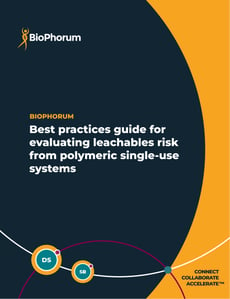Evaluating leachables risk from polymeric single-use systems

Use of single-use systems (SUS) and SUS components in clinical and commercial biopharmaceutical manufacturing has increased rapidly in recent years. Polymeric SUS components offer significant advantages over conventional (i.e., reusable) components in terms of flexibility, speed and efficiency of operation. Extensive experience across the industry
has demonstrated that SUS can be deployed safely in both clinical and commercial applications. However, there remain lingering concerns for implementing SUS components into a biopharmaceutical manufacturing process. One of these lingering concerns is the potential for compounds leaching from the polymeric component(s) and entering the process
stream as a result, with potential negative impacts on product quality and/or process performance.
Independent industry surveys have shown that concerns about extractables and leachables are the number one barrier to implementing disposables technologies. There is clear regulatory guidance around what is required by regulatory authorities such as the EMA, yet to date there has been limited or no information (consensus or best practice) on how companies should do this.
BioPhorum’s 'Leachables' team is a collaboration of representatives from 17 major biopharmaceutical manufacturers seeking to close this gap. The best practices guide for evaluating leachables risk from polymeric single-use systems used in biopharmaceutical manufacturing represents the consensus position of this team of experts and key opinion leaders. The guide is in four sections focusing on risk assessment, leachables study design, analytical methods and lessons learned from experience.
